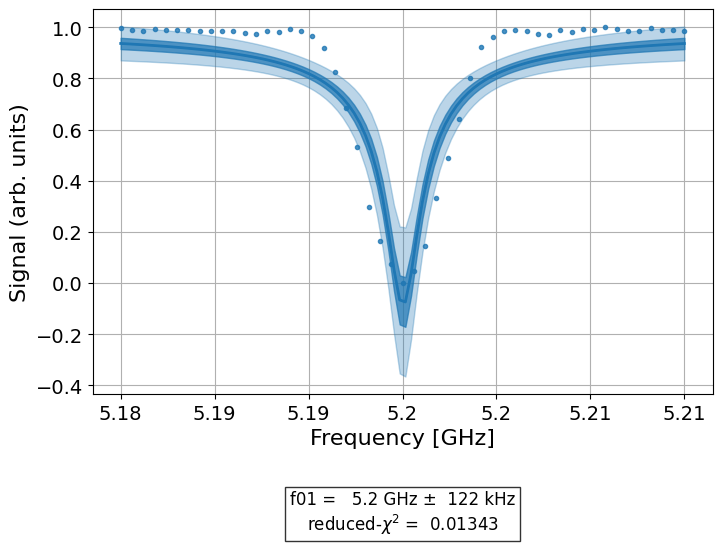Note
This is the documentation for the current state of the development branch of Qiskit Experiments. The documentation or APIs here can change prior to being released.
RoughFrequencyCal¶
- class RoughFrequencyCal(physical_qubits, calibrations, frequencies, backend=None, auto_update=True, absolute=True, cal_parameter_name='drive_freq')[source]¶
A calibration experiment that runs
QubitSpectroscopyto calibrate the qubit transition frequency.Analysis class reference
Experiment options
These options can be set by the
set_experiment_options()method.- Options
Defined in the class
BaseCalibrationExperiment:result_index (int)
Default value:-1The index of the result from which to update the calibrations.group (str)
Default value:"default"The calibration group to which the parameter belongs. This will default to the value “default”.
Defined in the class
Spectroscopy:amp (float)
Default value:0.1The amplitude of the spectroscopy pulse. Defaults to 0.1 and must be between 0 and 1.duration (int)
Default value:2.4e-07The duration of the spectroscopy pulse. Defaults to 1024 samples.sigma (float)
Default value:6e-08The standard deviation of the flanks of the spectroscopy pulse. Defaults to 256.width (int)
Default value:0The width of the flat-top part of the GaussianSquare pulse. Defaults to 0.
Defined in the class
BaseExperiment:max_circuits (Optional[int])
Default value:NoneThe maximum number of circuits per job when running an experiment on a backend.
Example
import numpy as np from qiskit_experiments.calibration_management.calibrations import Calibrations from qiskit_experiments.calibration_management.basis_gate_library import FixedFrequencyTransmon from qiskit_experiments.library.calibration.rough_frequency import RoughFrequencyCal qubit=0 library = FixedFrequencyTransmon() cals = Calibrations.from_backend(backend=backend, libraries=[library]) freq_est = backend.defaults().qubit_freq_est[qubit] frequencies = np.linspace(freq_est-15e6, freq_est+15e6, 51) exp_cal = RoughFrequencyCal((qubit,), cals, frequencies, backend=backend) exp_cal.set_experiment_options(amp=0.005) cal_data = exp_cal.run().block_for_results() display(cal_data.figure(0)) cal_data.analysis_results(dataframe=True)

name experiment components value quality backend run_time chisq unit 71d9b2cc @Parameters_ResonanceAnalysis RoughFrequencyCal [Q0] CurveFitResult:\n - fitting method: least_squa... good PulseBackendV2 None None None ce492a20 f01 RoughFrequencyCal [Q0] (5.20002+/-0.00012)e+09 good PulseBackendV2 None 0.013425 Hz See also
Superclass
qiskit_experiments.calibration_management.base_calibration_experiment.BaseCalibrationExperimentSuperclass
qiskit_experiments.library.characterization.qubit_spectroscopy.QubitSpectroscopySuperclass
qiskit_experiments.library.characterization.spectroscopy.Spectroscopy
Initialization
See
QubitSpectroscopyfor detailed documentation.- Parameters:
physical_qubits (Sequence[int]) – List with the qubit on which to run spectroscopy.
calibrations (Calibrations) – If calibrations is given then running the experiment may update the values of the frequencies stored in calibrations.
frequencies (Iterable[float]) – The frequencies to scan in the experiment, in Hz.
backend (Backend | None) – Optional, the backend to run the experiment on.
auto_update (bool) – If set to True, which is the default, then the experiment will automatically update the frequency in the calibrations.
absolute (bool) – Boolean to specify if the frequencies are absolute or relative to the qubit frequency in the backend.
cal_parameter_name (str | None) – The name of the parameter to update in the calibrations. This defaults to drive_freq.
- Raises:
QiskitError – If there are less than three frequency shifts.
Attributes
- analysis¶
Return the analysis instance for the experiment.
Note
Analysis instance set to calibration experiment is implicitly patched to run calibration updater to update the parameters in the calibration table.
- backend¶
Return the backend for the experiment
- calibrations¶
Return the calibrations.
- experiment_options¶
Return the options for the experiment.
- experiment_type¶
Return experiment type.
- num_qubits¶
Return the number of qubits for the experiment.
- physical_qubits¶
Return the device qubits for the experiment.
Methods
- circuits()¶
Create the circuit for the spectroscopy experiment.
The circuits are based on a GaussianSquare pulse and a frequency_shift instruction encapsulated in a gate.
- Returns:
The circuits that will run the spectroscopy experiment.
- Return type:
circuits
- config()¶
Return the config dataclass for this experiment
- Return type:
- copy()¶
Return a copy of the experiment
- Return type:
- classmethod from_config(config)¶
Initialize an experiment from experiment config
- Return type:
- job_info(backend=None)¶
Get information about job distribution for the experiment on a specific backend.
- Parameters:
backend (Backend) – Optional, the backend for which to get job distribution information. If not specified, the experiment must already have a set backend.
- Returns:
A dictionary containing information about job distribution.
”Total number of circuits in the experiment”: Total number of circuits in the experiment.
”Maximum number of circuits per job”: Maximum number of circuits in one job based on backend and experiment settings.
”Total number of jobs”: Number of jobs needed to run this experiment on the currently set backend.
- Return type:
dict
- Raises:
QiskitError – if backend is not specified.
- run(backend=None, sampler=None, analysis='default', timeout=None, backend_run=None, **run_options)¶
Run an experiment and perform analysis.
- Parameters:
backend (Backend | None) – Optional, the backend to run on. Will override existing backend settings.
sampler (BaseSamplerV2 | None) – Optional, the sampler to run the experiment on. If None then a sampler will be invoked from previously set backend
analysis (BaseAnalysis | None) – Optional, a custom analysis instance to use for performing analysis. If None analysis will not be run. If
"default"the experimentsanalysis()instance will be used if it contains one.timeout (float | None) – Time to wait for experiment jobs to finish running before cancelling.
backend_run (bool | None) – Use backend run (temp option for testing)
run_options – backend runtime options used for circuit execution.
- Returns:
The experiment data object.
- Raises:
QiskitError – If experiment is run with an incompatible existing ExperimentData container.
- Return type:
- set_experiment_options(**fields)¶
Set the experiment options.
- Parameters:
fields – The fields to update the options
- Raises:
AttributeError – If the field passed in is not a supported options
- set_run_options(**fields)¶
Set options values for the experiment
run()method.- Parameters:
fields – The fields to update the options
See also
The Setting options for your experiment guide for code example.
- set_transpile_options(**fields)¶
Add a warning message.
Note
If your experiment has overridden _transpiled_circuits and needs transpile options then please also override set_transpile_options.
- update_calibrations(experiment_data)¶
Update parameter values in the
Calibrationsinstance.The default behaviour is to call the update method of the class variable
__updater__with simplistic options. Subclasses can override this method to update the instance ofCalibrationsif they require a more sophisticated behaviour as is the case for theRabiandFineAmplitudecalibration experiments.